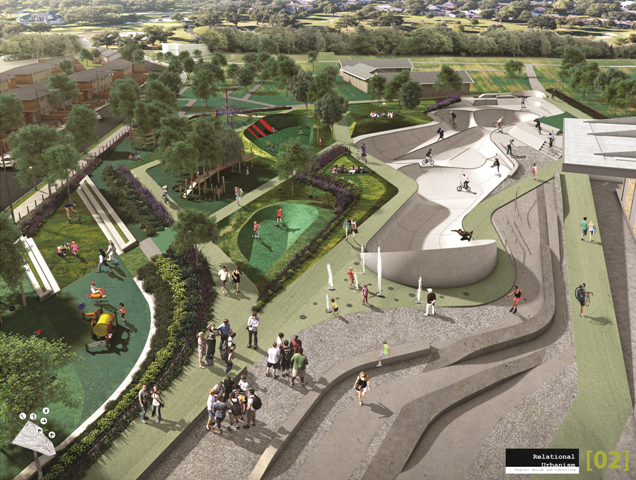03.02.16

02.02.16


The wait is finally over…
Irish Architecture Foundation are delighted to announce that the winners of our ‘Play Park, Ballyfermot’ design competition are Relational Urbanism, a multi-disciplinary architecture and urban design firm based in London. They inspired the judges with their aesthetically appealing and well-considered design, which managed to balance sensitivity to the site and local context with world-class ambition for the new civic space.
The winning practice have experience in designing urban landscapes and spaces which meet social and environmental needs, and have been quick to point out how their conversations with local community have impacted on their approach and the final design – “We are delighted to be able to develop this project further. So far the experience of working with the community has been great. We can see how the project benefited enormously from the feedback received and this also enabled the use of innovative tools which we believe will make the design responsive to local needs. We are eager to carry this process further and deliver a park which is both beautiful and meaningful to the people in Ballyfermot”. Enriqueta Llabres and Eduardo Rico for Relational Urbanism
The design guidelines for the new play park were directly shaped and influenced by a programme of community engagement events led by the Irish Architecture Foundation over the summer of 2015. The IAF, working alongside Dublin City Council, met with over 360 local people at picnics, play days, building design workshops and public meetings to outline plans for the park and take on board community suggestions, concerns and aspirations for this innovative community facility. Ger O’Reilly of Ballyfermot Youth Services has been key in the development of the project and says he is “over the moon with the decision to choose Relational Urbanism as the architects for this project. They really listened to our young people and took on board the community’s feedback in the second stage of the competition. They have come up with an amazing design that will no doubt be a huge success for Ballyfermot. I can’t wait to tell all the young people who have been involved in getting this project off the ground, I think they will be blown away by what is going to be delivered for Ballyfermot.”
The Play Park project has been funded by The Matheson Foundation in partnership with Dublin City Council and the IAF; and will combine a play area and skate/BMX park. The overall construction budget for the project is €500,000, making it one of the most significant investments in a play space in Ireland – “The architects [from Relational Urbanism] have proposed a visionary design for this Play Park and have demonstrated that they listened intently to both the jury and the community feedback after stage one of the competition process as that feedback is clearly evident in their design proposal”. Leslie Moore, Head of Parks Services, Dublin City Council.
It meets the Matheson Foundation’s objectives to help children fulfil their potential and promotes corporate philanthropy in Ireland, and they are excited by the potential of the winning design –”We are really excited about the chosen design. The winning architects really managed to bring to life the opportunities offered by the site and their design offers the most ambitious play facility for the positive development of young people in Ballyfermot. The process and community engagement has given rise to positive developments too. The children involved have seen and participated first hand in a process involving local politics and design. Their contribution has been vital to, and can clearly be seen in, the outcome of the winning design. Hopefully this will give them the confidence to engage in similar opportunities in the future.” Turlough Galvin, the Matheson Foundation.
The selection of a winning design in this competition marks an important juncture in the ‘Play Park, Ballyfermot’ project, a flagship programme which embodies the mission of Irish Architecture Foundation to engage the public and encourage them to participate in conversations around architecture and the built environment –
“The built environment is a cultural asset. It is essential to design it well and people must be at the heart of any strategy that effects their environment. The Irish Architecture Foundation prides itself on working across perceived boundaries and joining the work of architects and non-architects. Our goal in the Ballyfermot Play Park project was to create opportunities that enable both architects and communities of need to participate equally and confidently in a creative process that ultimately will be transformative for everybody. The winning design by Relational Urbanism, in consultation with the community, is an expression of the values and aspirations of the amazing Ballyfermot people.” Nathalie Weadick Director of Irish Architecture Foundation.
The other short-listed finalists in the competition were ‘Y Design Workshop’ from Dublin, Conte Murata Cheung from New York, and the joint bid of Dmau + Openfabric, two architectural design firms based in Amsterdam and Rotterdam respectively. The judging panel for the competition was chaired by Nathalie Weadick Director of the IAF and included Amica Dall of the Turner Prize winning design group Assemble, Ger O’Reilly, Instructor, Ballyfermot Youth Service, Leslie Moore, Head of Parks Services, Dublin City Council, Aimee Harding, Youth Worker and Ballyfermot Resident, Turlough Galvin, The Matheson Foundation, Gary Mongey, Box Architects and Chairperson of Irish Architecture Foundation.
We would like to congratulate the entire team at Relational Urbanism for their hard work and innovative approach to the project:
Lead Designers:
Enriqueta Llabres
Eduardo Rico
Coding Direction: Immanuel Koh
Project Leader: Giulio Dini
Landscape Architects: Lida Driva, Dimitra Bra, Israel Luna Mino
Rendering: Virtual Polygon
Cost Consultant: Arcadis
Watch them explain their design in their own words HERE
The Play Park, Ballyfermot Project is being funded by The Matheson Foundation in partnership with Dublin City Council and Irish Architecture Foundation.
03.02.16
01.02.16